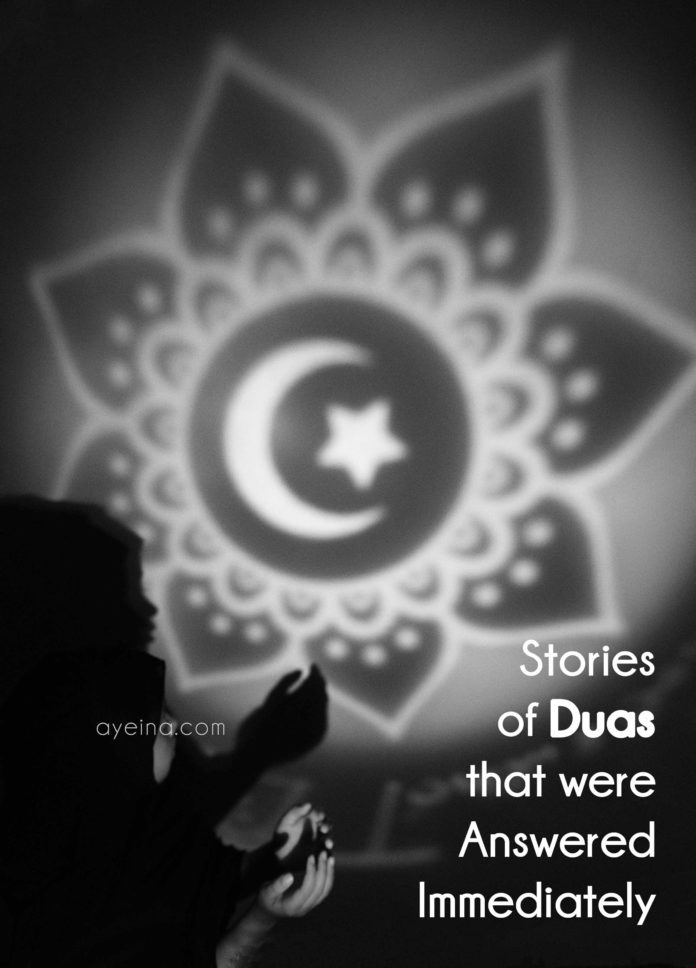PREVIOUS: Secrets of an accepted dua (+ free dua diary)
Isabella Marx (in collaboration with Team AYEINA)
Making dua is a wonderful part of our religion, and the more we ask from Allah, the more we might feel closer to Him. In Islam, the concept of “ask and ye shall receive” is applied to almost anything. After all, we are told:
‘Let one of you ask his Lord for his every need, even until he asks Him for the strap of his sandal when it breaks.’” [Hadith; Jami` at-Tirmidhi 3604i]
If you’re having a particularly good day, then it might be easy to believe that Allah will answer your dua. However, when you’re not following Allah’s commands and you’ve wronged yourself by not fulfilling His rights or the rights of His creation, then you feel like your dua will not have a chance of acceptance at all. Believing it’ll be answered gets harder because of the hurdles you’ve put in your mind. We can find instances not just of why we should make dua, but of duas being answered in the Quran and in stories from hadith – and even from the stories of the Salaf – like the one given below (taken from this post by AYEINA):
Dua of a Baker
One day, Imam Ahmed was travelling to Shaam and on the way, he stopped by a Masjid to spend the night. The guard of the Masjid told him, “You need to get out, the Masjid is closing”. Imam Ahmad had nowhere to go so he slept at the steps of the masjid instead. The guard, not knowing that he is Imam Ahmed (one of the most famous scholars of his time and beyond), picked up Imam Ahmad by his legs and dragged him to the middle of the street. A baker across the street saw him (not knowing he was Imam Ahmad) and said, “You can sleep in my bakery tonight while I work.”
Imam Ahmad went to stay at his place. There, he observed this man doing dhikr while putting the dough together, putting it in the oven, and through every step of the process – kneading, forming, baking, etc., he said: SubhanAllah (Glory be to Allah), Alhumdulillah (all praise is for Allah), La ilaaha il Allah (there is no God but Allah), Allahu Akbar (Allah is the greatest). The entire night, he made tasbeeh.
Imam Ahmad asked him, “How long have you been in this situation? Making tasbeeh of Allah?” The baker said: “My whole life”. Imam Ahmed asked: “What have you seen from Allah as a result of all this tasbeeh that you make?” The baker said: “I never made dua to Allah for anything except that He answered it.” Imam Ahmad asked: “Never?” He repeated: “I never made dua to Allah for anything except that He answered it – except for one.” Imam Ahmad asked: “And what is that?” He said: “To have a chance to see Imam Ahmad”.
Imam Ahmad embraced him with tears in his eyes and said: “(قد جاءك بأحمد) Here is Ahmad (Ahmad has come to you). Allah brought you Ahmad, dragging him by his feet to your bakery – if it wasn’t for you, I might have been sleeping in the Masjid”.
Stories from the Quran
One might argue that the stories from the Quran are the stories of the Prophets, so of course, Allah would answer them – but the People of the Cave, to our knowledge, were not. Rather, they were pious Muslims – an option for any one of us. By having faith that Allah knows what is best and that Allah will answer your dua, you can keep asking – after all, Prophets throughout the ages have asked for things that might have seemed ridiculous to us in this age and time, but they got them. So you, too, can trust with all your heart that Allah will answer your dua.
Dua of Adam and Hawwa السلام عليهم
رَبَّنَا ظَلَمْنَآ اَنْفُسَنَا وَإِنْ لَّمْ تَغْفِرْ لَنَا وَتَرْحَمْنَا لَنَكُوْنَنَّ مِنَ الْخَاسِرِيْنَ
They said, “Our Lord, we have wronged ourselves, and if You do not forgive us and have mercy upon us, we will surely be among the losers.” [Quran; 07:23]
Adam and Hawwa acknowledged their mistake and made Dua to Allah for forgiveness, while Iblis was too arrogant to do the same. In contrast, the Dua Iblis eventually made was for a long life that lasted until the Day of Judgement, not caring what came after (and Allah accepted his dua too).
Dua of Yunus السلام عليه
لَآ إِلٰهَ إِلَّآ أَنْتَ سُبْحَانَكَ إِنِّيْ كُنْتُ مِنَ الظَّالِمِيْنَ
And (remember) Dhan-Nun (Yunus), when he went off in anger and imagined that We shall not punish him (i.e. the calamities which had befallen him)! But he cried through the darkness (saying): La ilaha illa Anta , Glorified (and Exalted) are You . Truly, I have been of the wrong-doers.” [Quran; 21:87]
In the next verse, we see that Allah accepted His dua – “So We answered his call, and delivered him from the distress. And thus We do deliver the believers (who believe in the Oneness of Allah, abstain from evil and work righteousness).” Al-Qurtubi said: In this verse, Allah stipulates that whoever calls upon Him, He will answer him as He answered and saved Dhu’l-Noon (Yunus). This is what is meant by the words “And thus We do deliver the believers”. Al-Jaami’ li Ahkaam il-Qur’aan, 11/334. Of course, the answer is only through the power and permission of Allah, and “whoever” applies to the muminoon.
Messenger of Allah (ﷺ) said: “The supplication of Dhun-Nun (Prophet Yunus) when he supplicated, while in the belly of the whale was: ‘There is none worthy of worship except You, Glory to You, Indeed, I have been of the transgressors. (Lā ilāha illā anta subḥānaka innī kuntu minaẓ-ẓālimīn)’ So indeed, no Muslim man supplicates with it for anything, ever, except Allah responds to him.” [Hadith; Jami` at-Tirmidhi 3505]
After negating any perceived imperfection to Allah, Yunus owned up to his mistake. If a prophet uttered these words (admitting that he wronged himself), then aren’t we in need of these words too?
Dua of People of the Cave
رَبَّنَا آتِنَا مِن لَّدُنكَ رَحْمَةً وَهَيِّئْ لَنَا مِنْ أَمْرِنَا رَشَدًا
(Remember) when the young men fled for refuge (from their disbelieving folk) to the Cave, they said: “Our Lord! Bestow on us mercy from Yourself, and facilitate for us our affair in the right way!” [Quran; 18:10]
Just six verses later, how does their story unfold? “Your Lord will spread out for you of His mercy and will prepare for you from your affair facility.” A direct reply to their dua, the words matching up, and the answer a sign we still know about today. They were believers, and Allah aided them with their situation – as He so often does. It is usually known as the best Dua for istighfar.
Dua of Prophet Zakariyyah السلام عليه
رَبِّ هَبْ لِي مِن لَّدُنْكَ ذُرِّيَّةً طَيِّبَةً إِنَّكَ سَمِيعُ الدُّعَاءِ
At that time Zakariya (Zachariya) invoked his Lord, saying: “O my Lord! Grant me from You, a good offspring. You are indeed the All-Hearer of invocation.” [Quran; 03:38]
Putting his faith in Allah, Zakariyya السلام عليه supplicated the above. His wife was barren and he was very old – making it unlikely to have a child. Despite this, Allah granted him Yahya (who also went on to become a Prophet), as mentioned in the Quran; 21:90. However unlikely it is or how high the odds are, as was the case here, Allah’s power is infinitely greater, and things become that much more likely to come true.
Dua of Prophet Ibrahim السلام عليه
رَبَّنَا وَابْعَثْ فِيهِمْ رَسُولاً مِّنْهُمْ يَتْلُو عَلَيْهِمْ آيَاتِكَ وَيُعَلِّمُهُمُ الْكِتَابَ وَالْحِكْمَةَ وَيُزَكِّيهِمْ إِنَّكَ أَنتَ العَزِيزُ الحَكِيمُ
“Our Lord! Send amongst them a Messenger of their own (and indeed Allah answered their invocation by sending Muhammad Peace be upon him ), who shall recite unto them Your Verses and instruct them in the Book (this Quran) and Al-Hikmah (full knowledge of the Islamic laws and jurisprudence or wisdom or Prophethood, etc.), and sanctify them. Verily! You are the All-Mighty, the All-Wise.” [Quran; 02:129]
A dua that is still, to this day, answered. The teachings of the Prophet Muhammad (ﷺ) are still applied today, and Muslims around the world recite the verses and learn the hadith.
Dua Of Prophet Ayyub السلام عليه
أَنِّي مَسَّنِيَ الضُّرُّ وَأَنتَ أَرْحَمُ الرَّاحِمِينَ
“Verily, distress has seized me, and You are the Most Merciful of all those who show mercy.” – [Quran 21:83]
Prophet Ayub السلام عليه was ill for many years. After a long time of suffering from a painful disease, he turned to his Lord asking for His Mercy with this dua. And Allah responded in the next Aayah: “So We responded to him and removed what afflicted him of adversity. And We gave him his family and the like thereof with them as mercy from Us and a reminder for the worshippers .”
Dua Of Prophet Musa السلام عليه
رَبِّ اشْرَحْ لِي صَدْرِي- وَيَسِّرْ لِي أَمْرِي- وَاحْلُلْ عُقْدَةً مِّن لِّسَانِي – يَفْقَهُوا قَوْلِي – وَاجْعَل لِّي وَزِيرًا مِّنْ أَهْلِي…اشْدُدْ بِهِ أَزْرِي – وَأَشْرِكْهُ فِي أَمْرِي
“O my Lord! Open for me my chest (grant me self-confidence, contentment, and boldness). And ease my task for me; And make loose the knot from my tongue, (i.e. remove the incorrectness from my speech). That they understand my speech. And appoint for me a helper from my family…”Increase my strength with him, And let him share my task…” – [Quran; 20:25-32]
Then in Aayah 36, Allah said: “You are granted your request, O Musa (Moses)!” – Allah accepted his dua by aiding him through his brother Harun (Aaron) who shared his task (of conveying Allah’s Message and Prophethood). When Musa السلام عليه was sent by Allah to speak to the evil king Pharaoh, he made this dua as it’s said that he used to stutter as a result of a brand of fire which Musa (Moses) put in his mouth when he was an infant. . Allah also guided disbelieving magicians (appointed by Pharoah to defeat Musa السلام عليه) as a result (as mentioned in Aayah 70).
Dua Of Prophet Lut السلام عليه
رَبِّ انصُرْنِي عَلَى الْقَوْمِ الْمُفْسِدِينَ
“My Lord, support me against the corrupting people.” – [Quran; 29:30]
Then Allah sent angels for his help, who destroyed his corrupt nation and saved Lut السلام عليه and his daughters.

Stories from the Ahadith
Dua of Uwais al Qarni
Usair b. Jabir reported that when people from Yemen came to help (the Muslim army at the time of jihad) he asked them: Is there amongst you Uwais b. ‘Amir? (He continued finding him out) until he met Uwais. He said: Are you Uwais b., Amir? He said: Yes. He said: Are you from the tribe of Qaran? He said: Yes. He (Hadrat) ‘Umar (again) said: Did you suffer from leprosy and then you were cured from it but for the space of a dirham? He said: Yes. He (‘Umar) said: Is your mother (living)? He said: Yes. He (‘Umar) said: I heard Allah’s Messenger (ﷺ) say: There would come to you Uwais b. Amir with the reinforcement from the people of Yemen. (He would be) from Qaran, (the branch) of Murid. He had been suffering from leprosy from which he was cured but for a spot of a dirham. His treatment with his mother would have been excellent. If he were to take an oath in the name of Allah, He would honour that. And if it is possible for you, then do ask him to beg forgiveness for you (from your Lord). So he (Uwais) begged forgiveness for him. Umar said: Where do you intend to go? He said: To Kufa. He (‘Umar) said: Let me write a letter for you to its governor, whereupon he (Uwais) said: I love to live amongst the poor people. When it was the next year, a person from among the elite (of Kufa) performed Hajj and he met Umar. He asked him about Uwais. He said: I left him in a state with meagre means of sustenance. (Thereupon) Umar said: I heard Allah’s Messenger (ﷺ) as saying: There would come to you Uwais b. ‘Amir, of Qaran, a branch (of the tribe) of Murid, along with the reinforcement of the people of Yemen. He had been suffering from leprosy which would have been cured but for the space of a dirham. His treatment with his mother would have been very kind. If he would take an oath in the name of Allah (for something) He would honour it. Ask him to beg forgiveness for you (from Allah) in case it is possible for you. So he came to Uwais and said: Beg forgiveness (from Allah) for me. He (Uwais) said: You have just come from a sacred journey (Hajj) ; you, therefore, ask forgiveness for me. He (the person who had performed Hajj) said: Ask forgiveness for me (from Allah). He (Uwais again) said: You have just come from the sacred journey, so you ask forgiveness for me. (Uwais further) said: Did you meet Umar? He said: Yes. He (Uwais) then begged forgiveness for him (from Allah). So the people came to know about (the status of religious piety) of Uwais. He went away (from that place)… [Hadith; Sahih Muslim 2542c]
Uways al-Qarni – Abu ‘Amr – was one of the foremost Taabi’een. He lived at the time of the Prophet ﷺ and became Muslim, but he did not meet him. What prevented him from traveling to meet him was the fact that he was preoccupied with taking care of his mother, as was narrated by al-Haafiz Abu Nu’aym in Hilyat al-Awliya’ (2/87) from Asbagh ibn Zayd – “he would bow until morning came… he would prostrate until morning came” meaning that he would bow at length in prayer until morning came, then on another night, he would prostrate at length in prayer until morning came.
Dua of Sarah (wife of Ibrahim السلام عليه)
Abu Huraira reported Allah’s Messenger (ﷺ) as saying: “Prophet Ibrahim (السلام عليه) never told a lie but only thrice: two times for the sake of Allah (for example, his words): “I am sick,” and his words: “But it was the big one amongst them which has done that” and because of Sara (his wife). He had come in a land inhabited by haughty and cruel men along with Sara. She was very good-looking amongst the people, so he said to her: If these people were to know that you are my wife they would snatch you away from me, so if they ask you tell them that you are my sister and in fact, you are my sister in Islam, and I do not know of any other Muslim in this land besides I and you. And when they entered that land the tyrants came to see her and said to him (the king): ‘There comes to your land a woman, whom you alone deserve to possess’, so he (the king) sent someone (towards her) and she was brought to him, and Ibrahim (السلام عليه) stood in prayer. When she visited him (the tyrant king came) he could help but stretch his hand towards her and his hand was tied up. He said: ‘Supplicate to Allah so that He may release my hand and I will do no harm to you.’ She did that and the man repeated (the same highhandedness) and his hand was again tied up more tightly than on the first occasion. He said the same thing to her again, and she again did that (supplicated), but he repeated (the same high-handedness and his hands were tied up more tightly than on the previous occasion). He then again said: ‘Supplicate your Lord so that He may set my hand free; by Allah, I shall do no harm to you.’ She did and his hand was freed. Then he called the person who had brought her and said to him: ‘You have brought to me the satan and you have not brought to me a human being, so turn them out from my land,’ and he gave Hajar as a gift to her. She returned (along with Hajar) and when Ibrahim (السلام عليه) saw her, he said: ‘How have you returned?’ She said: ‘With full safety (have I returned). Allah held the hand of that debauch and he gave me a maid-servant.’ Abu Huraira said: ‘O sons of the rain of the sky, she is your mother.’ [Hadith; Sahih Muslim 2371]
Dua of a Companion who recited Surah Fatiha for Cure
Narrated Ibn`Abbas: Some of the companions of the Prophet (ﷺ) passed by some people staying at a place where there was water, and one of those people had been stung by a scorpion. A man from those staying near the water, came and said to the companions of the Prophet, “Is there anyone among you who can do Ruqya as near the water there is a person who has been stung by a scorpion.” So one of the Prophet’s companions went to him and recited Surat-al-Fatiha for a sheep as his fees. The patient got cured and the man brought the sheep to his companions who disliked that and said, “You have taken wages for reciting Allah’s Book.” When they arrived at Medina, they said, ‘O Allah’s Messenger (ﷺ)! (This person) has taken wages for reciting Allah’s Book” On that Allah’s Messenger (ﷺ) said, “You are most entitled to take wages for doing a Ruqya with Allah’s Book” [Hadith; Sahih al-Bukhari 5737]
There are many stories from the past where duas of the pious were accepted. If you know more, let us know in the comments below and we can add those too in shaa Allah for more inspiration.
Co-Author’s Bio: Isabella Marx is a student living in America. She enjoys reading, writing, and spending time with her family. Above all, though, she is a Muslim.
More articles on the topic of Dua:
List of 30 Duas – a dua a day (Free Printable Cards)
How to Make Dhikr and Dua a Daily Habit
Do’s and Don’ts of Istikhara (+FREE dua printable)
Supplicate to Allah with Allah’s Words (List of Quranic Duas)






